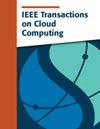Efficient Online Computing Offloading for Budget- Constrained Cloud-Edge Collaborative Video Streaming Systems
IF 5.3
2区 计算机科学
Q1 COMPUTER SCIENCE, INFORMATION SYSTEMS
引用次数: 0
Abstract
Cloud-Edge Collaborative Architecture (CEA) is a prominent framework that provides low-latency and energy-efficient solutions for video stream processing. In Cloud-Edge Collaborative Video Streaming Systems (CEAVS), efficient online offloading strategies for video tasks are crucial for enhancing user experience. However, most existing works overlook budget constraints, which limits their applicability in real-world scenarios constrained by finite resources. Moreover, they fail to adequately address the heterogeneity of video task redundancies, leading to suboptimal utilization of CEAVS's limited resources. To bridge these gaps, we propose an Efficient Online Computing framework for CEAVS (EOCA) that jointly optimizes accuracy, energy consumption, and latency performance through adaptive online offloading and redundancy compression, without requiring future task information. Technically, we formulate computing offloading and adaptive compression under budget constraints as a stochastic optimization problem that maximizes system satisfaction, defined as a weighted combination of accuracy, latency, and energy performance. We employ Lyapunov optimization to decouple the long-term budget constraint. We prove that the decoupled problem is a generalized ordinal potential game and propose algorithms based on generalized Benders decomposition (GBD) and the best response to obtain Nash equilibrium strategies for computing offloading and task compression. Finally, we analyze EOCA's performance bound, convergence rate, and worst-case performance guarantees. Evaluations demonstrate that EOCA effectively improves satisfaction while effectively balancing satisfaction and computational overhead.预算受限的云边缘协同视频流系统的高效在线计算卸载
云边缘协作架构(CEA)是一个杰出的框架,为视频流处理提供低延迟和节能的解决方案。在云边缘协同视频流系统(CEAVS)中,高效的视频任务在线卸载策略对于增强用户体验至关重要。然而,大多数现有的作品忽略了预算约束,这限制了它们在有限资源约束下的现实场景中的适用性。此外,它们不能充分解决视频任务冗余的异质性,导致CEAVS有限资源的利用率不理想。为了弥补这些差距,我们提出了一种高效的CEAVS在线计算框架(EOCA),该框架通过自适应在线卸载和冗余压缩共同优化精度,能耗和延迟性能,而不需要未来的任务信息。从技术上讲,我们将预算约束下的计算卸载和自适应压缩表述为最大化系统满意度的随机优化问题,定义为准确性、延迟和能源性能的加权组合。我们使用Lyapunov优化来解耦长期预算约束。我们证明解耦问题是一个广义有序势博弈,并提出了基于广义Benders分解(GBD)和最佳响应的算法来获得计算卸载和任务压缩的纳什均衡策略。最后,我们分析了EOCA的性能边界、收敛速度和最坏情况下的性能保证。评估表明,EOCA有效地提高了满意度,同时有效地平衡了满意度和计算开销。
本文章由计算机程序翻译,如有差异,请以英文原文为准。
求助全文
约1分钟内获得全文
求助全文
来源期刊

IEEE Transactions on Cloud Computing
Computer Science-Software
CiteScore
9.40
自引率
6.20%
发文量
167
期刊介绍:
The IEEE Transactions on Cloud Computing (TCC) is dedicated to the multidisciplinary field of cloud computing. It is committed to the publication of articles that present innovative research ideas, application results, and case studies in cloud computing, focusing on key technical issues related to theory, algorithms, systems, applications, and performance.
 求助内容:
求助内容: 应助结果提醒方式:
应助结果提醒方式:


